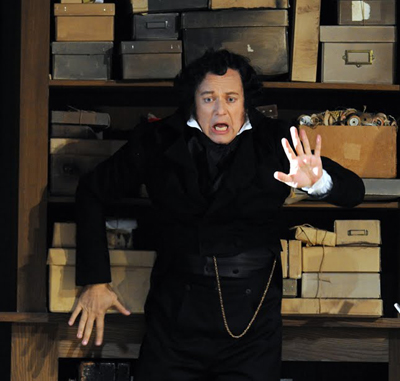
Met "Die Meistersinger von Nürnberg" heeft Glyndebourne zich aan haar meest ambitieuze productie gewaagd uit haar geschiedenis. Het is geen onverdeeld artistiek succes geworden, althans dat is de teneur in de eerste perscommentaren. Glyndebourne heeft zelfs de casting niet goed onder de knie gekregen : voor de solisten is er enkel lof voor Gerald Finley als Sachs, Johannes Martin Kränzle als Beckmesser en Michaela Selinger als Magdalena.
David McVicar plaatst het werk in het post-napoleontische Duitsland van het begin van de 19e eeuw, de vroegromantische era van Goethe en Schiller, de tijd waarin Wagner werd geboren en die aan de basis ligt van zijn geestelijke ontwikkeling.
"If commercially it was a preordained success, artistically it barely registered. In 35 years’ acquaintance with Meistersinger, this was by far the slowest, dullest, most insipid I have seen", schrijft The Financial Times. "Did McVicar direct this idea-free Meistersinger in his sleep? There is not the slightest attempt to probe beneath Wagner’s deceptively benign surface. (..). The show is so inoffensive as to be tasteless."
Bloomberg: "David McVicar’s production is handsome, slickly stage managed, and full of fascinating details that illuminate the relationships between characters. On the downside, it feels a tad safe and decorative. (..) Finley’s vocal triumph is matched by Johannes Martin Kranzle as his comical nemesis Beckmesser. "
Soms is David McVicar's regie erg origineel, bekent Barry Millington in de London Evening Standard maar "too often it's routine". "Interviewed in advance of the opening, McVicar acknowledged the clear anti-semitic undertow of the work but his promise to subvert its message was not kept. Beckmesser (excellently played and sung by Johannes Martin Kränzle) remains onstage, sobbing, after his humiliation at the song contest, thereby attracting some sympathy, while a mood of non-triumphal bonhomie is suggested by the Masters linking arms in a kind of Bavarian Auld Lang Syne. But a bit of circus juggling and a knees-up hardly constitute a radical reappraisal of the work. German directors have been tackling the difficult issues raised by Meistersinger for three decades now; for some reason British directors won't bite the bullet."
(..) Gerald Finley, in his role début as Hans Sachs, marshals his vocal resources to perfection, with a text-responsive line and beauty of tone.
Heelwat positiever klinkt The Independent: "Some might call David McVicar’s first Glyndebourne staging “traditional” but that’s something of a dirty word in opera nowadays and to imply dullness rather than due diligence would never do. McVicar is better than that and when, as here, he is the soul of discretion there is a very good reason for it. "
"Wagner’s entire score is songful, pouring forth benevolent counterpoint from prelude to final chorus. And perhaps the greatest joy of this evening was in hearing Vladimir Jurowski and the London Philharmonic Orchestra weaving so rich and detailed a narrative. The playing was at times extraordinarily beautiful with solo oboe and clarinet distilling and elevating so many special moments. "
"It was also a significant night for Gerald Finley whose Hans Sachs could well prove to be the pinnacle of his career. I had thought him unlikely casting but the beauty and intelligence of his singing, the clarity of his words and toughness and charisma of his persona dominated the stage. He was also for once credibly attractive to Eva (Anna Gabler) and the perfect counterpart to Johannes Martin Kränzle’s brilliant and believable Beckmesser."
The Guardian meent Giacomo Meyerbeer te herkennen in de figuur van Beckmesser. Toch lijkt McVicar van de finale geen antisemitisch tractaat te maken: "Holy German art, as the staging reminds us, embraces Dürer, Bach, Goethe and Schiller. But during his final paean, Sachs also indicates that the Beckmessers and, by implication, the Meyerbeers of this world, also have their rightful place in any list of "masters". His gesture goes unheeded by the crowd, and a chill creeps into the final scenes of jubilation.
(..) Finley, silencing concerns that the role would defeat him, is extraordinary both vocally and dramatically. There are no problems here with slips in intonation or a lack of lustre in his tone that marred some of his work last year. Few interpreters, meanwhile, have registered quite so vividly Sachs's intense feelings for his late wife, or the emotional pain involved in his realisation that a relationship with Anna Gabler's Eva could only result in disaster for them both. (..) Kränzle - prissy, funny, and heartbreaking at the end - is very much Finley's equal in subtlety."
De Frankfurter Algemeine Zeitung vindt de productie eerder braaf :
"Im kanadischen Bariton Gerard Finley, der mit dieser strapaziösesten aller Rollen erstmals eine Wagner-Oper in Angriff nimmt, hat Glyndebourne einen nuancierten und klar artikulierenden Hans Sachs, der den Anforderungen durchaus gewachsen ist, was ihm das begeisterte Publikum mit einer stehenden Ovation bescheinigte.
(..)Den musikalischen Höhepunkt bietet Johannes Martin Kränzles wunderbar agiler, pingelig-süffisanter Beckmesser, ganz in Schwarz aufgemacht wie ein Kinderfänger. Grandios auch der Chor und der strahlende Orchesterklang, trotz Vladimir Jurowskis überraschend uninspirierter Leitung. "
De FAZ besluit : "Mit einer Fülle von glanzvollen Inszenierungen des Opernrepertoires hat Glyndebourne in den letzten Jahren frische Interpretationen gewagt, die ganz im Sinne von Hans Sachs eine auf den Säulen der Tradition ruhende Erneuerung darstellten. Ausgerechnet bei den „Meistersingern“ ist dies nicht gelungen."
De laatste voorstelling van "Die Meistersinger von Nürnberg" zal te zien zijn via live streaming op guardian.co.uk en glyndebourne.com op 26 juni vanaf 13u40. Gratis uiteraard.
Laten we deze voorstelling maar eens afwachten. Nicholas Hytners "Cosi fan tutte" werd ook erg lauw onthaald in de pers. Op dvd bleek het achteraf een klein juweel!

Geen opmerkingen:
Een reactie posten